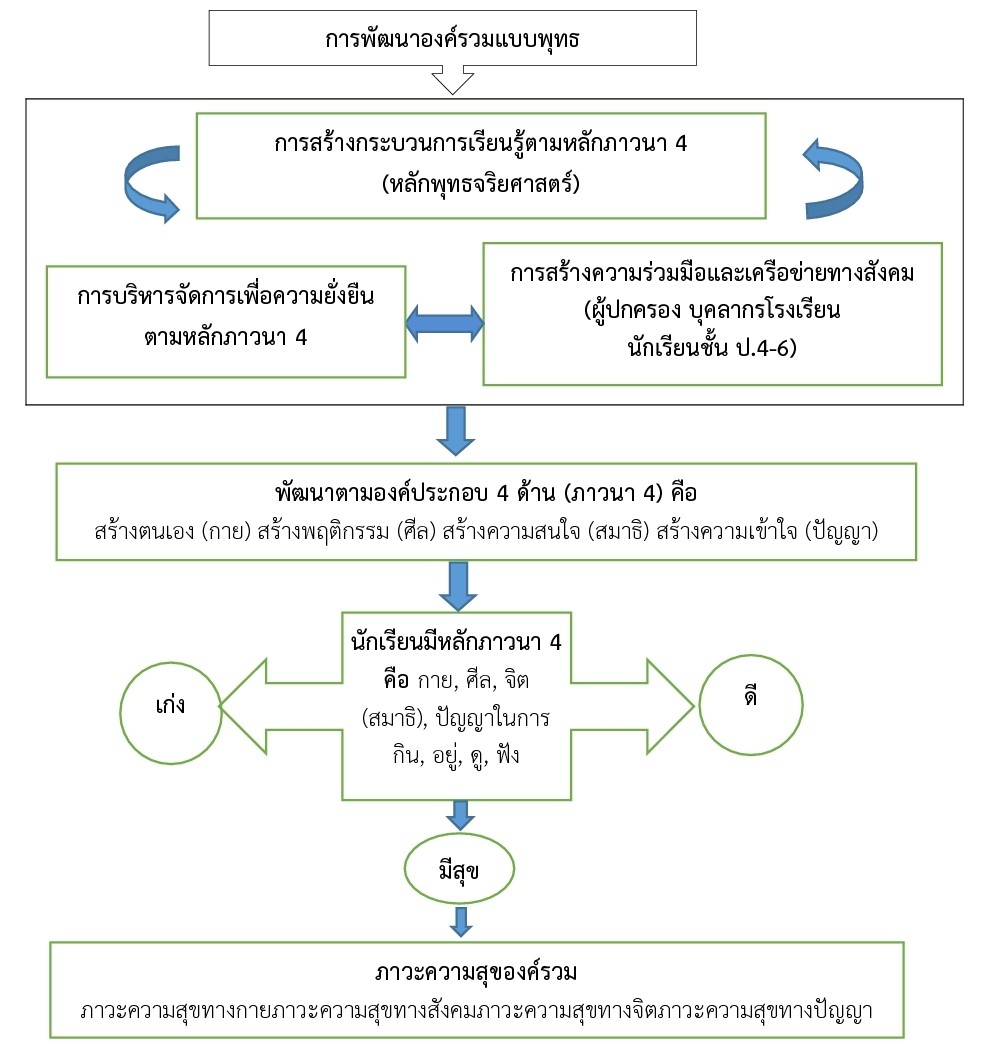The Study Analyzes the Principles of the Four Foundations of Mindfulness in the Development of Lifestyle Behaviors among Students in Grades 4-6 at Ban Khok Lao School, Bayaow Subdistrict, Wang Sam Mo District, Udon Thani Province
Main Article Content
Abstract
The purposes of this research were 1) study lifestyle behavior of students in grades 4-6 at Ban Khok Lao School, 2) Study and analyze the principles of Buddhist ethics, Bhavana 4, in developing lifestyle behavior of students in grades 4-6, 3) Propose guidelines for applying the principles of Buddhist ethics, Bhavana 4, in developing lifestyle behavior of students in grades 4-6 at Ban Khok Lao School, it is qualitative research. The research tools used were in-depth interviews. Behavior observation form Key informants included 7 parents, 7 teaching staff and 7 students who analyzed the data.with a descriptive method based on the principle of inductive method.
The research results found that:
1. Lifestyle behavior of students in grades 4-6 at Ban Khok Lao School, includes four aspects of student behavior or expression: 1) responsibility for learning 2) discipline 3) honesty and integrity 4) sacrifice for the public.
2. Principles of Buddhist ethics, Phāna 4, in the development of lifestyle behavior of students in grades 4-6, including Dhamma principles that are principles of conduct to achieve prosperity in life, namely Phāvana 4, consisting of kaipāna, which is the development of the body and precepts. Bhavana is the development of precepts. Citta Bhavana is the development of the mind. Panya Bhavana is the development of wisdom.
3. Proposing guidelines for applying the principles of Buddhist ethics, Bhavana 4, in developing lifestyle behaviors. of students in grades 4-6 at Ban Khok Lao School, Bayao Subdistrict, Wang Sam Mo District Udon Thani Province is to bring the principles of Buddhist ethics, Phawana 4, into use in developing 4 areas as follows: Responsibility Discipline Honesty Sacrifice By organizing Dhamma training activities Pay homage and receive precepts Meditate and spread kindness Pray to prosper to achieve the desired behavior according to the policy of basic education, such as being responsible for learning Follow school discipline. Be honest to yourself and society. There is sacrifice for the duties assigned.
Article Details

This work is licensed under a Creative Commons Attribution-NonCommercial-NoDerivatives 4.0 International License.
เพื่อให้เป็นไปตามกฎหมายลิขสิทธิ์ ผู้นิพนธ์ทุกท่านต้องลงลายมือชื่อในแบบฟอร์มใบมอบลิขสิทธิ์บทความ ให้แก่วารสารฯ พร้อมกับบทความต้นฉบับที่ได้แก้ไขครั้งสุดท้าย นอกจากนี้ ผู้นิพนธ์ทุกท่านต้องยืนยันว่าบทความ ต้นฉบับที่ส่งมาตีพิมพ์นั้น ได้ส่งมาตีพิมพ์เฉพาะในวารสาร วิชาการธรรม ทรรศน์ เพียงแห่งเดียวเท่านั้น หากมีการใช้ ภาพหรือตารางของผู้นิพนธ์อื่นที่ปรากฏในสิ่งตีพิมพ์อื่นมาแล้ว ผู้นิพนธ์ต้องขออนุญาตเจ้าของลิขสิทธิ์ก่อน พร้อมทั้ง แสดงหนังสือที่ได้รับการยินยอมต่อบรรณาธิการ ก่อนที่บทความจะได้รับการตีพิมพ์References
กรรณิการ์ กงแก้ว. (2550). ความต้องการพัฒนาบุคลากรของอาจารย์มหาวิทยาลัยฟาร์อีสเทอร์น. (วิทยานิพนธ์ศึกษาศาสาตรมหาบัณฑิต). เชียงใหม่: มหาวิทยาลัยเชียงใหม่.
ณัฐ จันทร์หนูหงส์. (2554). ศึกษาพฤติกรรมเชิงจริยธรรมของนักเรียนชั้นมัธยมศึกษาปีที่ 1-6 โรงเรียนสีกัน (วัฒนานันท์อุปถัมภ์) เขตดอนเมือง กรุงเทพมหานคร. (วิทยานิพนธ์พุทธศาสตรมหาบัณฑิต). พระนครศรีอยุธยา: มหาวิทยาลัยมหาจุฬาลงกรณราชวิทยาลัย.
ทวีศักดิ์ ทองทิพย์. (2555). การวิเคราะห์การศึกษาตามหลักไตรสิกขา. (สารนิพนธ์พุทธศาสตรดุษฎีบัณฑิต). พระนครศรีอยุธยา: มหาวิทยาลัยจุฬาลงกรณราชวิทยาลัย.
นาวิน เหมือนแสง. (2560). การบริหารสถานศึกษากับการพัฒนาคุณธรรมจริยธรรมของผู้เรียนในสถานศึกษาขั้นพื้นฐาน สังกัดสำนักงานเขตพื้นที่การศึกษาสมุทรสาคร. กรุงเทพฯ: มหาวิทยาลัยธรรมศาสตร์.
พระจิรวัฒน์ อุตฺตมเมธี (วุฒิพงศ์). (2557). การศึกษาเพื่อพัฒนาตนตามทัศนะของพระพรหมคุณาภรณ์ (ป.อ.ปยุตฺโต). (วิทยานิพนธ์พุทธศาสตรมหาบัณฑิต). พระนครศรีอยุธยา: มหาวิทยาลัยมหาจุฬาลงกรณราชวิทยาลัย.
พระบุญทัน จารุวณฺโณ (กณาลักษณ์). (2553). การศึกษาพฤติกรรมเชิงจริยธรรมกับความมีวินัยของนักเรียนมัธยมศึกษา โรงเรียนสิรินธรวิทยานุสรณ์ เทศบาลตำบลนิคมลำโดมน้อย อำเภอสิริธร จังหวัดอุบลราชธานี. กรุงเทพฯ: มหาวิทยาลัยธรรมศาสตร์.
พระพุทธินันทน์ บุญเรือง. (2551). การพัฒนาทรัพยากรมนุษย์แบบยั่งยืนตามหลักพระพุทธศาสนา. (วิทยานิพนธ์พุทธศาสตรมหาบัณฑิต). พระนครศรีอยุธยา: มหาวิทยาลัยมหาจุฬาลงกรณราชวิทยาลัย.
พระมหาพยุงศักดิ์ ธมฺมวิสุทฺธิเมธี (โสภาสาย). (2555). การศึกษาวิเคราะห์มนุษย์ที่สมบูรณ์ตามแนวพุทธปรัชญา. (วิทยานิพนธ์พุทธศาสตรมหาบัณฑิต). พระนครศรีอยุธยา: มหาวิทยาลัยมหาจุฬาลงกรณราชวิทยาลัย.
พระมหาพรสวรรค์ กิตฺติวโร (จันโปรด). (2554). ศึกษาการพัฒนาทรัพยากรมนุษย์ตามหลักกุศลกรรมบถ 10 ประการ. (วิทยานิพนธ์พุทธศาสตรมหาบัณฑิต). พระนครศรีอยุธยา: มหาวิทยาลัยมหาจุฬาลงกรณราชวิทยาลัย.
พระสมศักดิ์ สนฺตวาโจ (สนธิกุล). (2551). การพัฒนาทรัพยากรมนุษย์เชิงพุทธตามแนวของพระพรหมคุณาภรณ์ (ป.อ.ปยุตฺโต). (วิทยานิพนธ์พุทธศาสตรมหาบัณฑิต). พระนครศรีอยุธยา: มหาวิทยาลัยมหาจุฬาลงกรณราชวิทยาลัย.
พัชรินทร์ แจ้งอิ่ม. (2556). การพัฒนาคุณภาพชีวิตการทำงานของข้าราชการครูตามหลักภาวนา 4 ในเขตอำเภอท่าตะโก จังหวัดนครสวรรค์. (วิทยานิพนธ์พุทธศาสตรมหาบัณฑิต). พระนครศรีอยุธยา: มหาวิทยาลัยมหาจุฬาลงกรณราชวิทยาลัย.
พุทธทาสภิกขุ. (2542). บางแง่มุมของกามในทัศนะพุทธทาสภิกขุ. กรุงเทพฯ: สุขภาพใจ.
มหาจุฬาลงกรณราชวิทยาลัย. (2539). พระไตรปิฎกภาษาไทย ฉบับมหาจุฬาลงกรณราชวิทยาลัย. กรุงเทพฯ: มหาจุฬาลงกรณมหาวิทยาลัย.
อ้อมเดือน สดมณี และคณะ. (2553). ปัจจัยเชิงบูรณาการที่เกี่ยวข้องกับพฤติกรรมการทำงานอย่างมีจริยธรรมของแกนนำชุมชนในภาคกลาง: การศึกษาระยะที่หนึ่ง. กรุงเทพฯ: สถาบันวิจัยพฤติกรรมศาสตร์ มหาวิทยาลัยศรีนครินทรวิโรฒ.

